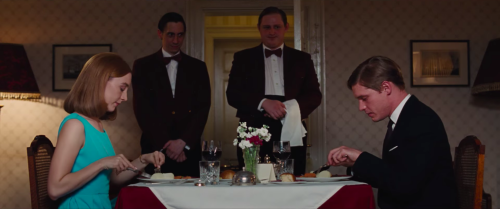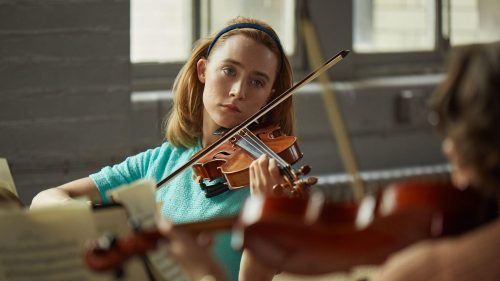(Alessandra Luciano) On Chesil Beach by Dominic Cooke, based on Ian McEwan’s book of the same title, has everything to be a solid movie. It is set in post World War II England, the Beatles are about to be a major thing, Chuck Berry and Elvis already are, the NHS is in its teen years and social classes are still very much divided. Therefore, putting a love story in this backdrop appears to be a no-brainer in order to create a decent well-rounded film about love, desire, emancipation, and ambition.
However, the love story of working class Edward Mayhew (Billy Howle) and upper class Florence Ponting (Saoirse Ronan) misses the mark by far and ends up being a rather flat and vapid movie, with no real story nor take-away. The film is told in flashbacks as we join Florence and Edward in their hotel room on their wedding night. The flashbacks are supposed to help you understand and contextualise what is happening, providing further insight into the characters, in order to explain the diegetic present. Whereas the flashbacks into Florence and Edward’s past carry some information (how they met, their families, their political engagement etc.) they still fall flat, as what is provided are merely tidbits that do not add-up to fully fledged characters.
The film opens as the newlyweds are about to enjoy a special meal depicting the best of post-War British cuisine: a melon with a pickled cherry, followed by some sad looking beef and vegetables.
The spectator soon understands that tensions are running high between the couple, and the discomfort is made palpable through tight camera shots and angles, and even though Florence comments on the beautiful landscape we never get to peak out of the window, but the spectator remains firmly put in that old and heavily decorated hotel room.
As their dinner progresses the situation becomes nearly unbearable to watch, and the flashbacks have done nothing to make you care. Not only because the camera is closed in tight on the actors and situation, but also because Cooke has attempted to add some misplaced comical relief. The servers are slapstick type comedians who spy and giggle on their guests, and have clattering plates, silver wear and a serving trolley as their accompanying soundtrack.

(c) Number Nine Films / BBC Films
Or the moment where Edward is still fully clothed on the bed, trying to remove his shoes. This scene may make you chuckle but the whole first 20 minutes are not only infused with the awkwardness of a couple who doesn’t know how to approach their first night together, but also with the clumsiness of the director who just does not know what he is doing in that hotel room.
From the start the film mentions certain topics that could feed into a larger narrative about being young and in love in a new society that however isn’t quite there yet. Nevertheless, the old, like the decor of the hotel room, still prevails, especially in your private life.
However, the film mostly fails its female character, who could have been the one redeeming element of the movie.
Indeed, Florence is an ambitious strong lead. She is a violinist who rules over her quintet with strength, poise and fear. Florence knows where she wants to be and how she will get there. These are, albeit scarce, some of the best moments in the film.

(c) Number Nine Films / BBC Films
It is telling then that once Ronan’s character is reduced to her sexuality, and it becomes the topic of contention and strive within the couple, ultimately leading to the unravelling of their marriage, her character is dropped, and the remainder of the film (and book for that matter) is focused on bumbling Edward. Who we don’t really care about.
Cooke and McEwan attempt to create meaning behind Florence’s shyness and nervousness concerning intercourse by rooting her sexual history in violence. It is never made explicit, but when Edward prematurely ejaculates on his bride the scene is cut with a young Florencewith her father. The spectator is made to understand that something traumatic must have happened, and that she has been carrying that weight with her ever since.
Why give us this insight into Florence and then drop her? The rest of the film and book is based on Edward’s regret of having let her go and his dandy lifestyle, he actually never learns of her trauma. This is where it becomes clear that McEwan and Cooke know nothing about female sexuality. I believe it may be because women can’t just have sex. There has to be an exposé, a commentary or a back story to their sexual desires or lack thereof. No wonder then that toward the end Edward is unable to say anything redeeming to his bride in order to salvage their marriage. He, like his authors, lacks the vocabulary and intelligence to do so.

(c) Number Nine Films / BBC Films
On Chesil Beach missed the mark in being something relevant, in spite of the material. It could have been an exploration of young love in a changing world, not rooted in anything else but how complicated politics, sex and feelings are.
Finally, nothing is ever aired, said or finished On Chesil Beach. Neither is the conversation between Florence and Edward, nor is the movie with its constant dropping of political and social events that truly lead nowhere and remain one dimensional (British politics, nuclear war, class struggle, mental health, societal changes). Even when we are outside on the beach the shots never reveal a greater open landscape, but the film remains folded into itself, ultimately giving away McEwan’s and by extension Cooke’s vision turned toward the past rather than the future.
You can see the film at Utopia.
Als partizipative Debattenzeitschrift und Diskussionsplattform, treten wir für den freien Zugang zu unseren Veröffentlichungen ein, sind jedoch als Verein ohne Gewinnzweck (ASBL) auf Unterstützung angewiesen.
Sie können uns auf direktem Wege eine kleine Spende über folgenden Code zukommen lassen, für größere Unterstützung, schauen Sie doch gerne in der passenden Rubrik vorbei. Wir freuen uns über Ihre Spende!
